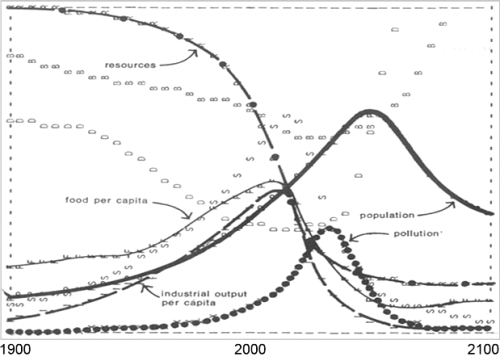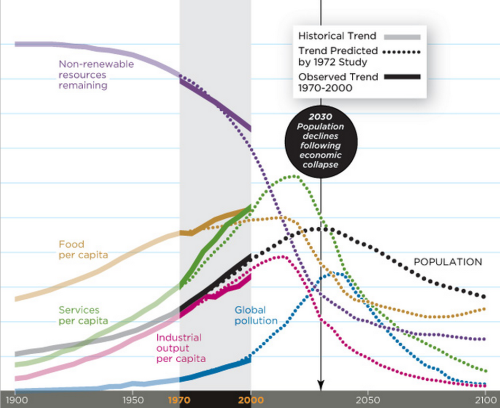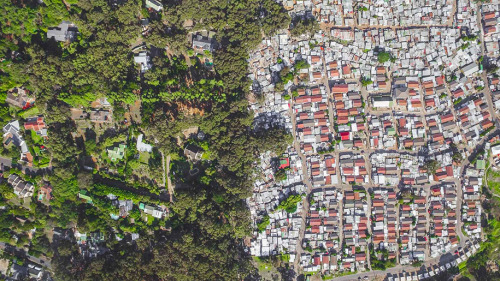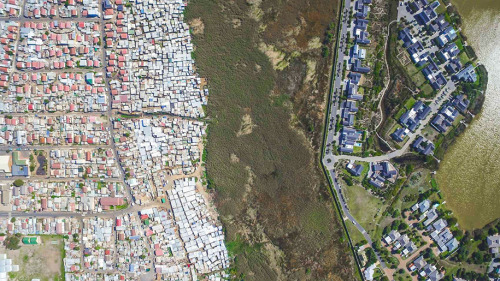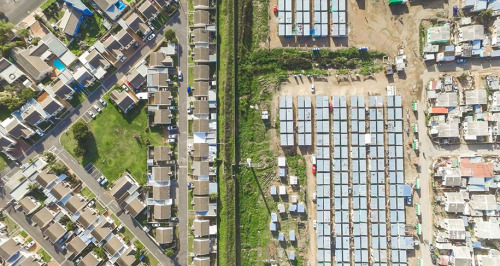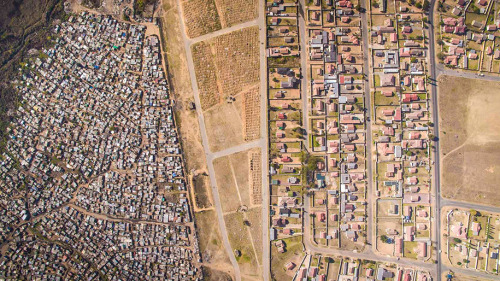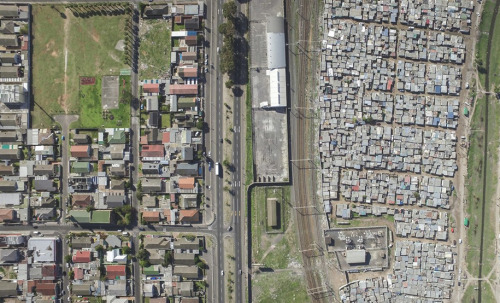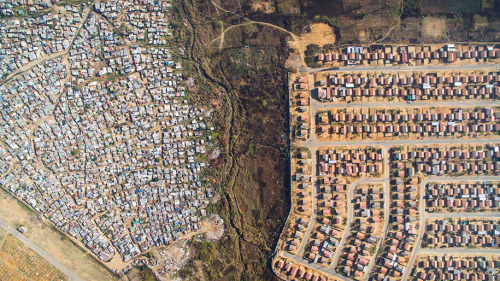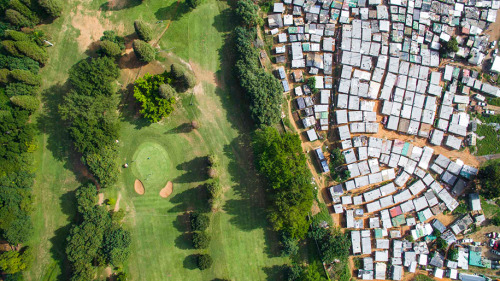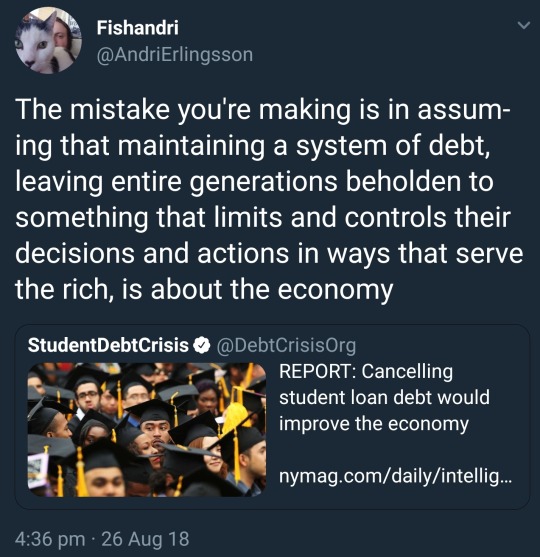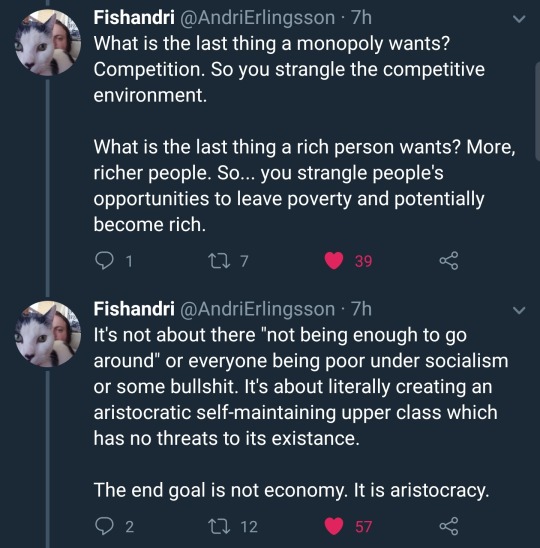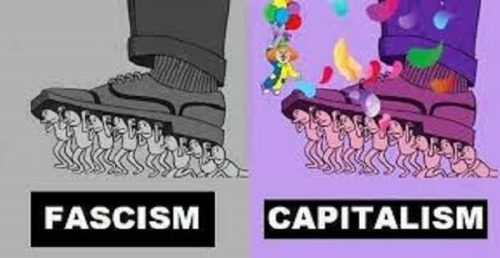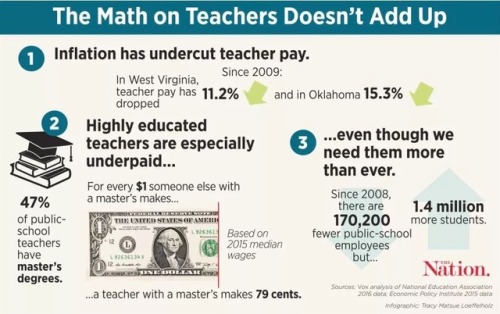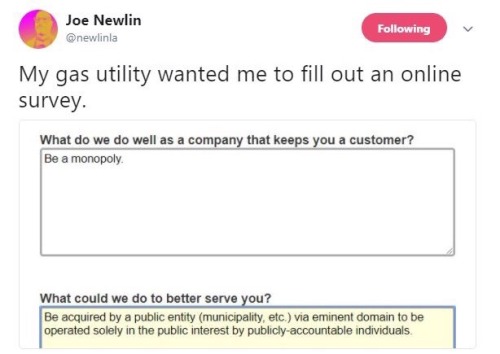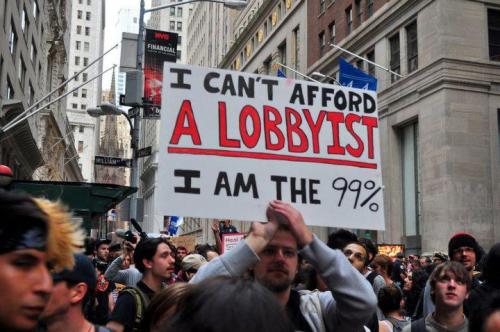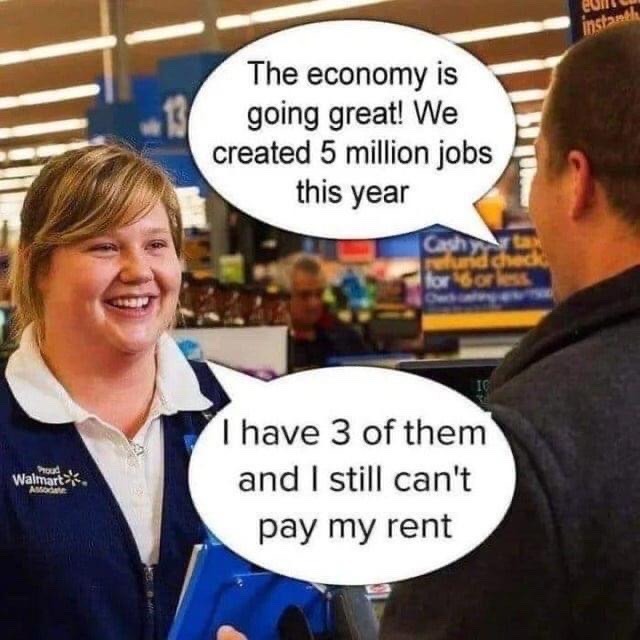#economy
40 years ago in 1972, the Club of Rome released a highly controversial environmental study, The Limits to Growth (AB). It estimated that if we continued to consume more than nature was capable of providing, global economic collapse and precipitous population decline could occur by 2030.
Research by Australian physicist Graham Turner supports the conclusions reached 40 years earlier by the MIT researchers that performed the original study. Turner compared real-world data from 1970 to 2000 to the first model and found that the predictions nearly matched the facts. “There is a very clear warning bell being rung here,” he says. “We are not on a sustainable trajectory.” (viaSmithsonian)
Post link
Mexico City – The conflicts of renewal
Unequal Scenes | Johnny Miller |Via
Cape Town-based photographer Johnny Miller reveals distinct lines between rich and poor in a striking (and unsettling) series of photographs. Taken using drones, the aerial perspective presents the harsh reality of past Apartheid policies and the continued disparity in a way that can’t be ignored.
Post link
Me, wanting to buy something from a clothing company that pays living wages:
god it’s so expensiveIt is not too expensive, it is fairly priced and I’m just not paid enough.Honestly I have a theory that a big reason why corporations hate the idea of higher wages is that their entire business model revolves around having the lowest prices, rather than the best product or service. If we get paid better, we can afford to make a choice.
Oh
this actually isn’t just a theory, it’s an entire deliberate tactic, and if you major in business they literally spend multiple semester-long classes teaching you how to do it
Christmas can be a hard time for some people.
Don’t judge people or get angry if they won’t come to your function, maybe they’re doing their best just to keep their heart beating today.
Don’t expect people to bring presents, it’s been a hard year, they might be struggling just to put food on the table, keep the lights on or buy their meds.
Don’t force the holiday spirit on people. Some people have suffered severe trauma through the holiday period. You still expect them to be jolly about it just for you?
Christmas is a time to love, to be kind and care for others. Not to force big parties, bankruptcy, meltdowns or flashbacks on others.
Fuck societies expectations. Just spread the love.
Nurses showing a set of newly born triplets to a surprised father in a New York City hospital, 1946. Photograph by Keystone-France

New IFS research today shows that the average debt a student has on graduating university has risen to over £50,000. For the students coming from the lowest income families, this can be as much as £57,000 with £5,800 of that purely from interest accrued since starting their courses.
Under the Conservative government, student loans have been increased from £3,000 per year to £9,000 per year. Maintenance grants for low-income students have been replaced by extra loan allowance. Student loans are set to increase in line with inflation (or by £250 per year) for the foreseeable future, starting in September, regardless of teaching quality.
The IFS sees only two winners from the current system, and it’s certainly not the students who benefit. Students earning the minimum amount of repayments - which has been frozen at £21,000 for several years - are estimated to be 30% worse off than their equivalents under the old loan system. No, the only beneficiaries are the universities (although not 90% of their employees) and the government.
So what do you think, voters? How can we, as a voting force, work together to end this stranglehold the UK government has on us? We want to hear your ideas to fix what is becoming a very, very broken system, one which stifles recent graduates and the UK economy as a whole.
Young Voters UK is today officially committing to fighting Conservative policies on student finance.
Grand Junction Colorado - August 3rd
OVER 30 VENDORS
17 WORKSHOPS
FOOD TRUCKS BEER GARDEN HEMP COOKING DEMONSTRATION HEMP CLOTHING FASHION SHOW FAMILY FRIENDLY-KIDS GET IN FREE! AND MORE!!
-> Event Page
☮ ❤ ॐ
Post link
June 27th 2020 marked the fourth Micro-, Small and Medium-sized Enterprise (MSME) day, established by the International Council for Small Businesses (ICSB).
Along with online events, the ICSB published its annual report highlighting not only the importance of MSMEs as they relate to the United Nations Sustainable Development Goals but also calling for further political and regulatory support for the sector as the global economy looks to make a recovery.

Concept of a green economy
Ahmed Osman, President of the ICSB, used the annual report to share his perspectives on the future for MSMEs in the post pandemic world and posed the question ‘What is the new normal for MSMEs?’
‘There are six key factors every MSME or start-up needs to keep in mind post Covid-19,’ Osman stated, the first of these being financial assessment and security. Encouraging MSMEs to put in place a financial action plan, obtaining information about government relief packages and getting a clear picture of investor expectations, Osman said; ‘Once this financial risk assessment and support ecosystem are in place, one can execute the plan. This may involve deciding on a potential pay cut, pull back on investments related to infrastructure or expansion, halting new recruitment etc…’

Digital Business and Technology Concept
Having secured the financial footing the next factor was to re-evaluate the business plan in light of the new conditions. Osman stressed the importance of involving all stakeholders to come up with a mutually agreed set of new targets. The third factor to consider, according to Osman, was creating a ‘strong digital ecosystem.’ ‘If there is one thing that Covid-19 has taught businesses. It is the power of digital engagement. Even as an MSME, it helps to be present and active on digital media…Additionally, a digitally enabled internal ecosystem also needs to be in place that can accommodate remote working…without compromising data security or productivity of employees.’
The fourth factor Osman highlighted was adoption of the fourth revolution for business. ‘…This is also time to leverage the new age technology innovations and adopt the fourth revolution for business. While most SMEs and MSMEs look at this as an ‘out of league’ investment, it is actually very simple and can be incorporated for a higher ROI in the long run. Be it automation, CRM, ERP, IoT, a well planned strategy to scale to technology-enabled, highly productive next generation business can be worked out with a two to three year plan,’ Osman said.

Bulb future technology
Less reliance on physical space was the fifth factor Osman highlighted, anticipating a reversal in the trend that led to increasing the number of people in an office and home working becoming more normal.
The final factor Osman highlighted was the need to have a crisis management strategy in place. ‘It is vital to chalk up an effective crisis management plan that will take into consideration both immediate and long-term impact,’ he said.
Encouraging MSMEs to take stock, Osman asked ‘How did you help in the great pandemic? Quantify what you did for your employees, customers, community and country. Leverage the opportunity to build a better business, have credible solutions to the new major challenge and think globally act locally.’
Written by Muriel Cozier. You can find more of her workhere.
The report can be foundhere.
Momentum for a post-pandemic ‘green recovery’ continues, as the UK government and the European Commission set out steps to accelerate their recoveries, while supporting the paths to net zero by 2050. Here we round-up just some of the initiatives announced in recent weeks to achieve these goals.

Human hands holding earth globe and tree
Plans for preservation of biodiversity
Speaking on the 3rd June 2020, at the Organisation for Security and Cooperation in Europe (OSCE) Economic and Environmental Committee Meeting, the UK’s Second Secretary from the UK Delegation, Justin Addison, said; ‘As we recover, we have an opportunity to protect and restore nature, reducing our exposure to deadly viruses and climate impact.’
Highlighting the UK’s global outlook on addressing climate change, Addison added, ‘The UK will soon announce a £64 million package to support Colombia to tackle deforestation and build a cleaner and more resilient economy in areas affected by Covid-19 and conflict.’

As well as the UK’s efforts to preserve biodiversity, the European Commission will be looking to protect and restore biodiversity and natural ecosystems. Frans Timmermans, the European Commission’s Executive Vice President added that, ‘It can boost our resilience and prevent the emergence and spread of future virus outbreaks. We have now seen that this relationship between us and the natural environment is key to our health.’

Earth held in human hands
Enabling low-carbon solutions and boosting clean growth
EU:
In early June, a letter was sent to decision-makers across the European Union from more than 100 investors, urging the EU to ensure a green recovery from the covid-19 pandemic is delivered.
Investors are keen to ensure the government builds on The European Green deal to deliver a long term commitment that will accelerate the economy into one that is more green and carbon resilient post coronavirus.
The European Green deal, set out before the pandemic, details some of their targets including, a 50-55% emissions reduction by 2030; a climate law to reach net-zero emissions by 2050; a transition fund worth €100bn and a series of new sector policies to ensure all industries are able to decarbonise.

A shoot of a plant and planet Earth
UK:
To boost clean growth, the UK Government has recently launched a £40 million Clean Growth Fund that will ‘supercharge green start-ups’.
This fund will enable UK clean growth start-ups to scale up low-carbon solutions and drive a green economic recovery.
Potential examples of projects the fund could support include areas in power and energy, buildings, transport and waste.
Business Secretary Alok Sharma said: ‘This pioneering new fund will enable innovative low-carbon solutions to be scaled up at speed, helping to drive a green and resilient economic recovery.’
Written by Tiffany Hionas. You can find more of her work here.
Who actually pays for your credit card rewards? | Vox
Here’s why you’re paying for credit card rewards — even if you use cash.Shoppers love credit card rewards. Banks promise offers of cash back, bonus miles, and cash bonuses to get you to sign up and spend. In 2018, 92% of all credit card spending was made on a rewards card.
For more follow | 4 your brain |
Don´t forget to activatenotifications(click here to see how) !
One of the important steps in our evolution will be to let go of our clinging to the economy. Or at least the economy as it exists today.
In the economy as it exists today, we have incentive to monetize everything… and this has slowly crept into our relationships, our food, our health, our willingness to offer our own gifts to the world, even our access to nature.
I’m not saying money is bad and we should avoid it. Money is inherently neutral. Some of the beliefs we attach to money can be harmful - that we aren’t safe without it, that life can’t be full and rich and beautiful without it, that it factors in to our worthiness in any way.
Economics measures how much money is getting passed around. When we walk our own dogs instead of hiring a dog walker, we are “not contributing” to the economy. When we watch each other’s kids for free, we are “not contributing” to the economy. So don’t worry if the economy is contracting a little or a lot. Maybe we are just sharing more, being more self-sufficient, or realizing that we don’t need more items.
Wishing you all feel safe in a time of “economic uncertainty” and also wishing you financial evolution to go with your spiritual evolution, whatever that may mean to you. xoxo Nikki

Can Wall Street save Trump from himself? William D. Cohen asks in the March 2017 issue.
(Image: Doug Chayka)
“The Islamic financial system is the only one in the world that has not been affected by the American real estate crisis, if there is a collapse, it is the only one that will survive. The reason is that the Islamic financial system is not involved in illegal and unethical dealings. Sharia even forbids investing money in products on the basis of usury and making money for money from money.” She said @lorettanapoleoni H/T @3sat #economy #america #i̇slam #islamicquotes #islamic #islamophobia #islampost #islamicposts #islamicart #islamdaily #islamdini #economics
https://www.instagram.com/p/CHFVOR3nHAPfp9-fM0ZVhbckHi0oSF7bRhD8dc0/?igshid=1fri3gqnfitr0

